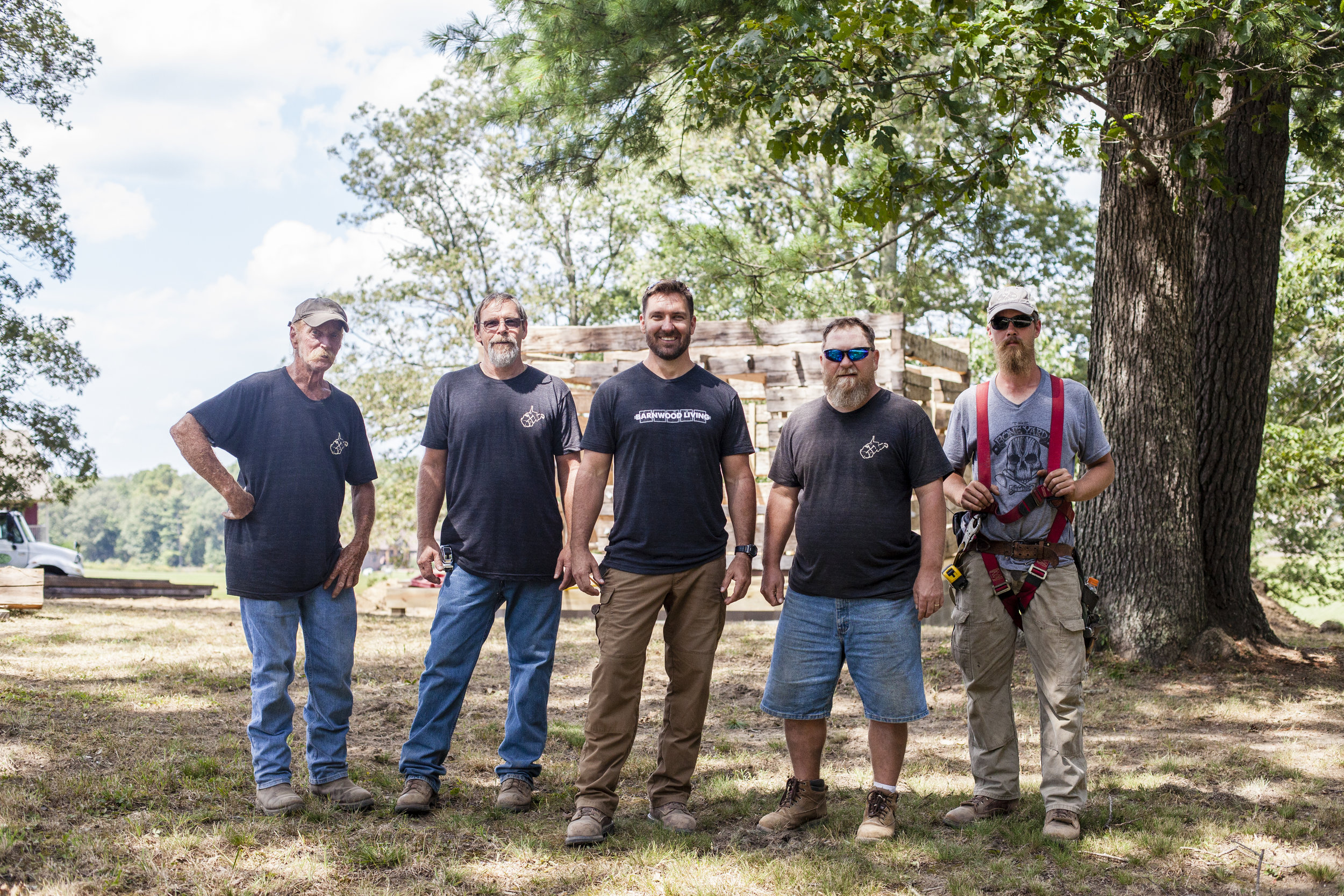Escatawba: On the Fly

By Jake Maynard
When you get down to it, fly-fishing is a collection of opposites. It is comprised mostly of quiet solitude, but punctuated by a few moments of wild excitement. It requires singularity and focus, but takes place in the kind of places that inspire day-dreaming. The goal is to trick a fish into thinking that a little tuft of feather and yarn is a bug, even though the creek is full of real bugs. You work tirelessly to trick the fish, hook the fish, and reel the fish from the creek into your hands. Then you carefully put the fish back into the water. And you do it again. Or, if you’re like me, you work to cast the fly in the general direction of the fish without hooking yourself or any bystanders in the process.
I am at Escatawba Farms in Alleghany County, Virginia, standing waist deep in Dunlap Creek with Derrick Barr. Here at Escatawba, Derrick has transformed his family farm into a fly-fishing paradise. Over the last thirteen years, The Barrs have been working on their retreat day and night. They have lined parts of the creek bank with natural boulders to prevent erosion. They planted trees to keep the stream shaded and cool. They built walking paths and park benches; pavilions and even ponds. Their work shows. Escatawba is a beautiful mix of old Virginia and mountain playground—white fences, soft grass, and huge oaks give way to the broad slopes of Sweet Springs Mountain with Dunlap Creek hemmed to its base. Cardinals and wood thrushes zip from tree to tree. Derrick’s dog Atticus leads us around the property. A red-tailed hawk sits in a stand of poplars. I miss it, but Derrick points it out.
Here are the things that you need to know about Derrick Barr—he is a libertarian who studied history in college and likes to read about Thomas Jefferson and Stonewall Jackson. He tried cattle farming but likes managing trout waters better. He is funny, effusive, self-reliant, and spends a lot of time mowing the grass at Escatawba Farms. Apparently, he and his wife are also pretty busy. Derrick has just enough time to take me out for a quick fishing lesson before his weekly truckload of fish are delivered.
We’ve suited up in neoprene waders and are standing in the middle of the creek. The water is clear and cold. A dozen rainbow trout are just upstream, suspended like little submarines in the water. Over and over I flick the line towards them, but they’re just not interested. Derrick coaches me along. He tells me when to keep my wrist straight and when to turn my shoulders. I cast out and pull my line back just as a giant trout stalks my fly. I jerk the line too quickly and miss my chance. The fish are spooked, agitated; my trout is gone. “Oh, you missed him,” Derrick says. To use a fishing term, I’ve been skunked. We decide to hang it up for the morning. There’s a lot to do when you manage your own trout waters.
Derrick says that he has to spend some of his afternoon “stocking” trout—placing trout from elsewhere into his stretch of Dunlap Creek. Some of his fish swim away upstream or downstream, he explains. Some swim away and occasionally they die, so Escatawba often needs a new supply of fish. An old pick-up carrying a huge tank rolls onto the property, and I understand what he means. Derrick invites me to come along (to “put me to work” as he says) and we pile into the truck with the driver from the Monterey Fish Company.
It works like this: we drive to a deep channel in the creek, and the driver scoops the trout from the aerated tank with a net. He passes the netful of shimmering trout to me, and I pass them to Derrick. He puts them into the creek, and they just swim away like they’ve always been there. They look unfazed, even content with their new home. As we ride around the property, Derrick tells me about the seasons at Escatawba. He likes fall and spring the best. Although spring is the most popular time for fly-fishing, “fall is basically the mirror image of spring.” He continues. “The evenings and mornings are cool, but the days are still warm…Peak season is mid-October.” I’ve never thought about fishing as a fall venture, but with the mid-summer sun coming down hard on us, it seems like a good idea.
When the stocking is over and I am thoroughly drenched in fish water, I decide to call it a day. It has been a great day, even though I missed the big trout (they’re almost all big, by the way). So I missed the big trout. I tried to laugh it off at the stream, but I thought about it for part of my drive home. I thought about it in bed that night, and a few times the following week while I was supposed to be editing something else. I thought about it on and off until I made the short drive back to Escatawba Farms a few weeks later.
“Fly fishing gets an elitist label,” Derrick tells me as he gives me a number of different fly patterns to try. “But it was originally done by people of the lower socio-economic class.” He holds up a pattern that looks like a dragonfly, another that imitates an engorged tick, and a third that mimics a woolly caterpillar. “Everybody likes catching fish, but the guys who started making these couldn’t afford bait. He then gives me a pair of felt-bottomed boots, matches me with a good combination of rod and reel, and sends me off towards the water.
My fly-fishing odyssey begins at the aquarium—a deep, clear pool in the creek created by a sheer wall of limestone. I catch a branch on my first back-cast. Through the sunglasses, I can see the fish spook and scatter as I stumble into the stream. It’s time to move on.
I try a section of stream, a piece of the pond, and keep moving until I find a stretch of water that I like. Maybe I’m too impatient for fly-fishing, but standing there at the edge of the pond with the pines shading me from the midday sun, I begin to find the rhythm. The rod loads with the tension of the line; the fly flies forward and lands delicately on the water like, well, a fly. Repeat. Try again. Everything is quiet and still. It’s just me on the water. I begin to understand why people like this so much. “You have to concentrate so hard on what you’re doing that you forget your everyday problems.” Derrick had said earlier. “And that’s where the release is.” He is right, of course, but when my mind is clear and my arms are finally synchronized with the rod and reel, I am interrupted by an enormous rainbow trout.
Here I could tell you what actually happened with the fish, but fish stories are told rather for the enjoyment of the story than its veritas, so I’m going to tell it like this: the trout explodes from the stillness of the pond in a silvery shimmer and engulfs the fly. I struggle to react, shocked, but manage to lift the rod and set the hook as the beast tears off down the pond. The lesser trout scatter from the center of the pond like balls on a billiard table. They swim for cover. The reel screams, the rod arches, and the line becomes as taut as a mandolin string. The trout dodges and jerks. It leaps from the water and flips in the air—this is an especially acrobatic fish. I struggle to steer the trout back towards my side of the bank. And finally, after a few exhausting minutes, I reach into the water and lift out my first Escatawba trout—twenty inches long. Or was it twenty-six?
I catch a few more trout in the next couple of hours at Escatawba, and due to lack of skill, miss a half-dozen more. “With a guide,” Derrick tells me, “You could catch forty. These guys are that good.” Derrick is too busy running the business to guide, but he offers to set up anglers with an experienced local guide like Demian Wiles. Demian owns First Light Outfitters, a business that combines fishing expertise with first-class cuisine. While most guides offer up a cold ham sandwich, First Light augments a day at Escatawba with a feast—smoked chowder, honey and lemon glazed pork loin, sweet potato hash, even bread pudding or an apple tart—all prepared streamside while you fish. Demian loves to cook and cast at Escatawba Farms. “It’s great for me as a guide to have a place like this,” He says over the phone. “It’s the best private water in the area.”
With the help of guides like Demian Wiles, Escatawba has become a destination for both beginner and advanced anglers. “We’ve taught literally thousands of people to fish,” Derrick says as we recount my day’s success. “It’s a good place for a beginner because you get a lot of chances. There’s room for error here.” He must be telling the truth. I caught some fish, didn’t I?




